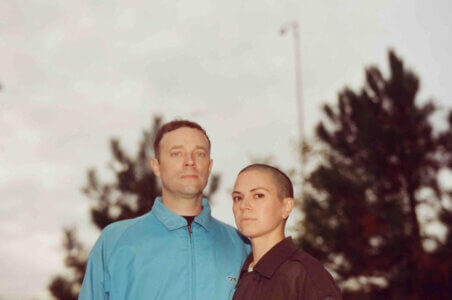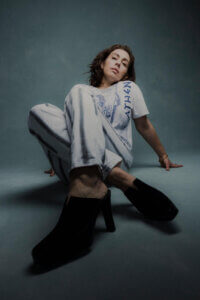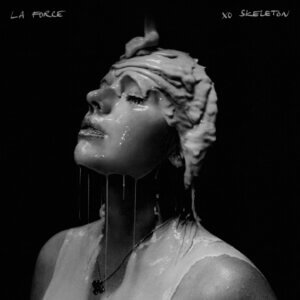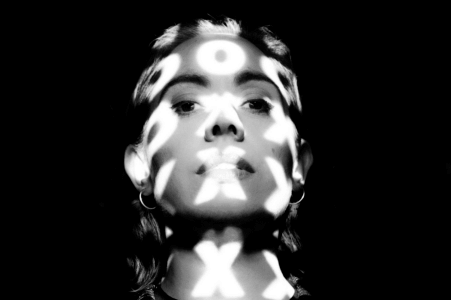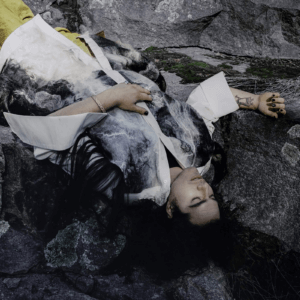Interview With The Barr Brothers

The Montreal-based Barr Brothers have been touring their atmospheric mixture of acoustic and electric music for a few years now. With their latest appearance on Letterman, which saw the host offer to move to Montreal and be their manager, the sound is reaching an ever-widening audience of lovers of old instruments, musical chops, and moody, abstract lyrics. The four members, Brad Barr, Andrew Barr, Sarah Page, and Andres Vial together create something their Facebook page calls “sci-folk/mysterious roots.” Northern Transmissions wanted to know a bit more about the mystery that’s got David Letterman ready to leave New York. Alice Severin was able to talk to Andrew Barr about the music, the journey, and where to find misused antiques.
Andrew Barr: Hi, nice to talk to you.
Northern Transmissions: Hello! Where are you now?
AB: We’re smack dab in the middle of the tour, kind of in the eye of the hurricane – we are taking a little rest back where Brad and I grew up. I’m actually on an island called Martha’s Vineyard, off the coast of Cape Cod, visiting an old friend here.
NT: That sounds really nice.
AB: Yeah, our family is from Rhode Island. It was American Thanksgiving, so we took the week off to come down here and visit. Lots of turkey, lots of pie, lots of walks on the beach.
NT: A good antidote to your busy schedule. And you were just on Letterman too. How was that?
AB: Yeah, that was great. It was cool because they took us by surprise, they had asked us the week before if we could come and we were only in Washington DC, which is only about six hours, so pretty much it was like getting a Christmas Eve present, got up the next morning, already en route to Letterman. And it’s great – they are all so nice there, they make it a really fun experience.
NT: And that’s the second time you’ve been on the show?
AB: Yeah, exactly. They are old friends at this point. (laughs)
NT: David Letterman seemed very keen, is he a big fan?
AB: Apparently so. You don’t talk to him except for that 30 seconds after you’ve finished playing the song, but yeah, he likes us – wants to manage us. (laughs)
NT: Yeah, that was funny when he said that – and that he was going to move up to Montreal. Do you live in Montreal full time?
AB: Yeah, we both live in Montreal – we moved there about 10 years ago.
NT: How is it as a place for inspiration? Do you find it a lot different than where you used to live?
AB: It’s quite different than New England. I mean, just the French influence and the fact that there’s that extra element of culture that’s really stands on its own, the style and the food, and the people seem really open to newness – whether it’s in art or culture. They seem like they are really interested in pushing things forward, and not sitting back and doing the same old routine.
NT: It seems like it has more of a European feeling, in a way – both modern and a respect for history.
AB: Yeah, I’d say it does. It has a European feeling and in some ways it reminds me of places like Berlin or even Brooklyn in New York. These cities that have a lot of history but somehow they feel like the young people are taking over. Using old loft spaces and using all kind of broken down store fronts to open up pop-up bars, stores. Boston, for instance, where I lived for a while, felt like it was so settled that there wasn’t a lot of room for you to do anything as a younger person. Montreal is the complete opposite. All of my friends are opening shops and taking risks. And the city provides for it. It’s affordable enough for that, and it’s an amazing breeding ground for art. And it’s kind of volatile too, in the best way. They will fight for what they believe in and it works.
NT: That sounds great – always good to hear about more support for something creative. And you have a new album out, your second, Sleeping Operator. How was the process of writing and recording this one? Did it feel very different from the first?
AB: Yeah, in a lot of ways they are about as different as you could imagine. With the first one my brother and I had just moved to Montreal and we were kind of strangers. Brad was writing a lot of songs at that time, and I was playing in some other groups in Montreal. The one thing we had together, we had always played music together before that, but now all we had was this recording studio and we would get together, and kind of work on his songs that he was in the process of writing. It kind of haphazardly happened over two years, that we just built up that batch of music. We would have friends come over and help us play but it wasn’t like a set band. And we met Sarah during that time and she started playing on a lot of the music. And then some friends of ours asked us to go on tour with them, and we just went down to the studio and grabbed ten of the songs that we thought were the most finished, made them a record, put a name on the band, and that was kind of the start, you know? And then we toured for really a solid three years and by the end of that three years, we really were a band – with Sarah Page on the harp, and Andres Vial who plays keyboards and basses. And then we went in for just two weeks and recorded this. This has lots of the techniques and dynamics that we gained playing live. So really they are pretty different.
NT: So your approach to recording is to try and capture more of what your live sound has been?
AB: Yeah, that was the approach on this record. But that being said, Brad and I took it back to our little studio and kind of roughed it up for almost a year. And a lot of the stuff that got done down there was really the more ghosty sounding stuff on the record. But the bulk of what you hear was really live performance of the band in a room in Montreal over this two week span.
NT: Listening to the songs, there seems to be a real balance between an acoustic sound range and an electric one as well. Do you think that’s something you try to aim for?
AB: Fortunately we have been able to play for some increasingly bigger audiences towards the end of touring the first record. And we had had a very quiet dynamic range when we first started out, and I think it started getting bigger to fill some of the spaces and to give the shows more of a tension release. So, yeah, by the time we made the second record, we had the desire to push the dynamic range of the band as much as we could, and still feel like – we wanted to make sure you could still always hear the harp – that there is still a very quiet side to the band which allows us to expand – when it gets loud, it feels really big.
NT: Half-Crazy seems to have parts that are reminiscent of traditional blues, with other elements added as well. Do you think you are inspired as a band by more traditional blues, to a certain extent? Do you look back and get inspiration from that time?
AB: Yeah. Brad and I had an uncle who was a blues guitar player and my dad was into Albert King and BB King and Robert Johnson and all these blues musicians. So we grew up really loving that music. But I think somewhere along the way we realized that this wasn’t really something that we wanted to pursue stylistically, to really wear it on our sleeve. But we did get really interested in a lot of music from Mali, from West Africa. I did some travelling and studying over there, and Brad and I both played with some Malian musicians in Boston. We were fascinated with the link between the Malian traditional music and the American blues. And then when we met Sarah, she was interested in West African music too. So we started kind of playing with that – the area in between the West African and the American blues. And I feel like that allowed Brad and I to get out from our blues roots without feeling like it was a regurgitated, generic sounding approach. And via Sarah too – kind of saying, ok, how can we rock out with a harp? Because you would never think, ok, I’m going to play this Chicago blues song, I need a harpist. But via the West African connection with the blues, and her love for that music, it really has opened up a lot of doors for us to be able to explore more than if we had just been drums and guitar.
NT: Do you feel it’s enabled different rhythms and harmonies that you can use?
AB: Yeah, for sure. There’s a lot of rhythms that we are throwing on that are straight-up traditional West African and there’s some stuff that’s just inspired by it. But the guitar/harp rhythmic counterpoint is really fun, it’s really exciting because harp can be used as a harmonic rhythmic instrument, but oftentimes it’s just used to lend these big accompaniment sweeps to a piece of classical music. In Sarah’s hands, it becomes a lot of different rhythmic things.
NT: Do you get people coming to you after shows and wanting to discuss the music?
AB: Yeah. A lot of our audience seem really intrigued by the instruments themselves and how we go about playing them. It’s like we could almost have an open discussion after the concert, because people are curious about this technique or that technique or want to ask about influences. Sometimes they mention someone we’ve never heard of, and then we go listen and say, yeah that is interesting. But it’s definitely a music loving audience, and that’s a beautiful thing. I think in Montreal for the first two years when we played it would just be musicians in the audience, which feels good.
NT: That’s definitely a nice compliment and says a lot about your sound too.
AB: But the album is not really something you can put on as background music. Some people have said it’s not really a record that plays in the background and catches your attention – you’re going to have to really dig in. I think we were aware of that making the record. I wouldn’t say it was something we set out to do, but it could get lost if it’s not listened to carefully. It might be a characteristic of the album, that it gets better with time. Ryan Freeman, the engineer who made this record, gave us the warning up front – “I’m not going to turn things up, it’s going to sound dark if you put it on next to anything that’s on the radio.” But I’m so happy that he made the decisions he did, because he really leaves a lot of space in the music for things to be heard.
NT: Do you have any favorite British folk musicians?
AB: I love Alexi Murdoch, he’s from Scotland. We grew up really loving Nick Drake. I’m sure I’m just drawing a blank, because we play all these festivals with great British artists.
NT: One of the guitars that Brad was playing looks like an old Gibson. How old is it, and do you modify instruments, or are you interested in older instruments?
AB: That’s a 1961 J-45 Gibson. And he really just put a Fishman pickup in the thing and it sounds so good. That guitar just sounds better every year. And we don’t really do a whole lot of modification, but we are definitely always on the hunt for interesting old instruments. We travel with a pump organ that’s made in either the late 1800s or early 1900s called a chaplain’s organ which folds up into a little box. They used to carry it out on to the field, to perform the last rites at a battle or evangelical preachers would travel around with it. We’re sure that thing has an interesting history. We found it in a barn in Maine. Some lady had it as a flowerpot. And we do modify the harp, in that we put a pickup system in it, and we run it through some distortion pedals, we run it through an old Magnatone amplifier. So I think we are really interested in acoustic instruments, and where you can use acoustic instruments, but get really abstract sounds that are really unfamiliar and add a bit of mystery, inspiration to the sounds. But most of the sound sources we start with are acoustic instruments that tend to be older. There’s something about walking on stage to all this gorgeous old wood, that has just really come to feel natural. No matter where we fly to, it’s something we make sure to have. And we do get a lot of people who tell us that the sound is really warm, and I think it has a lot to do with that.
NT: And five albums that inspire you.
AB: Ok. Thinking on behalf of the whole band, too. I know Sarah listens to a lot of Gustav Mahler.
Bob Dylan – Blood on the Tracks
Oumou Sangaré – Seya
Gilberto Gil – Expresso 2222
Van Morrison – Astral Weeks
Latest Reviews
Tracks
Advertisement
Looking for something new to listen to?
Sign up to our all-new newsletter for top-notch reviews, news, videos and playlists.





